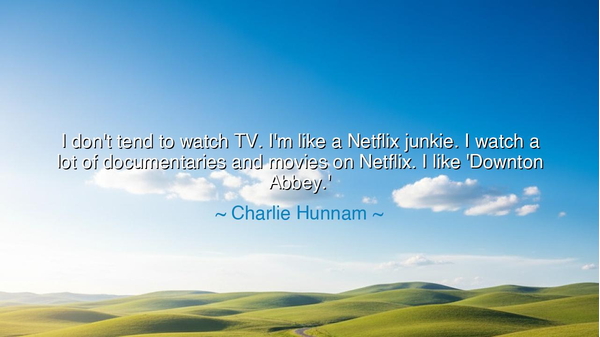
I don't tend to watch TV. I'm like a Netflix junkie. I watch a
I don't tend to watch TV. I'm like a Netflix junkie. I watch a lot of documentaries and movies on Netflix. I like 'Downton Abbey.'






In the age of information, the way we consume stories and knowledge has drastically transformed. Charlie Hunnam’s words, “I don’t tend to watch TV. I’m like a Netflix junkie. I watch a lot of documentaries and movies on Netflix. I like ‘Downton Abbey,’” offer us a glimpse into the evolving world of entertainment and the pleasures of modern life. In his statement, there is both a sense of personal preference and a subtle reflection on the times in which we live—a time when traditional television, with its fixed schedules and limited content, has been replaced by the on-demand, curated experience that services like Netflix provide.
The ancient world also had its own form of storytelling and entertainment, though it was often tied to communal experiences. The Greeks, for example, celebrated their gods and heroes through epic tales performed in theaters, such as the plays of Sophocles or Euripides, where people gathered to experience tragedy, comedy, and drama. The theater was the Netflix of its day—a place where stories of gods, men, and the human condition were explored for the entertainment and enlightenment of the masses. Just as Hunnam enjoys the immersive experience of watching documentaries and movies, so too did the people of ancient Greece seek to understand their world and their place within it through the art of storytelling.
However, Hunnam’s specific mention of “Downton Abbey,” a historical drama about British aristocracy, reveals an interesting shift. This modern preference for period dramas and historical narratives is not without precedent in the ancient world. Think of the tales of Rome and Greece that were told by Virgil in his Aeneid or Homer in the Iliad and Odyssey. These stories were not only forms of entertainment but were also vehicles for cultural identity, allowing individuals to connect with their heritage, explore the complexities of their history, and reflect on the enduring nature of power, duty, and class. In watching Downton Abbey, Hunnam and many others are drawn to a world where the complexities of social class, tradition, and duty are examined—a world that reflects an idealized past, just as the ancient epic poems reflected and shaped the ideals of their time.
The documentary aspect of Hunnam’s viewing habits also speaks to a profound human desire for truth and understanding. The ancient philosophers, such as Plato and Aristotle, sought knowledge not just for the sake of intellectual curiosity, but for the betterment of society and the individual. Today, documentaries serve a similar function—allowing us to explore the vast mysteries of our world, from the intricacies of nature to the complexities of human history. In this way, documentaries become a modern form of philosophical inquiry, a way for individuals to grapple with the truths of their world, just as the ancient thinkers sought to do.
Moreover, Hunnam’s comment highlights the deeply personal connection many people have with their entertainment choices. Just as the bards of ancient times would travel from village to village, telling tales of heroes and gods, modern actors, filmmakers, and storytellers offer us their own narratives to consume, shaping our understanding of the world. Hunnam’s choice to gravitate toward Netflix and films like Downton Abbey is not just about the content itself, but about the connection he feels to the stories being told. These narratives, whether fictional or rooted in history, provide an escape, a reflection, and often a deeper understanding of the complexities of society and the human spirit.
The lesson in Hunnam’s statement is one of choice and curation in the modern world. Whereas in ancient times, people had to partake in the stories available to them through oral traditions or local performances, we now have the power to shape our own viewing experiences. We can explore a myriad of genres, from the serious and the intellectual, like documentaries, to the lighthearted and the escapist, like historical dramas. This ability to curate our own stories and histories offers us a sense of control over how we interact with the world around us, allowing us to reflect, learn, and connect in ways unimaginable to the ancients.
In the end, the modern Netflix junkie is not so different from the ancient lover of stories. Both seek meaning, entertainment, and connection through the tales of others. The mediums may have changed, but the deep human desire to understand ourselves through stories remains eternal. Let us then, in our own lives, continue to seek out these stories—whether through documentaries, dramas, or other forms of entertainment—not only to escape, but also to engage deeply with the world, to learn, and to grow. Just as the ancient Greeks, Romans, and others found wisdom in their myths, so too can we find meaning in the stories of today.






AAdministratorAdministrator
Welcome, honored guests. Please leave a comment, we will respond soon